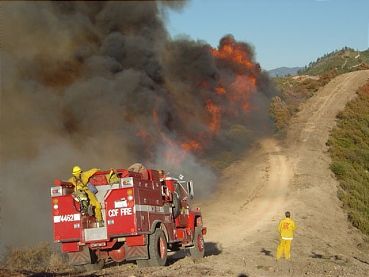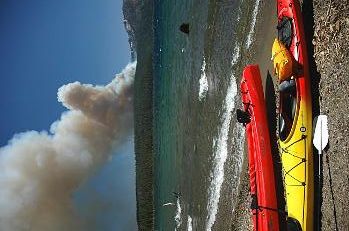CA fire chiefs warn state fire tax will hurt, not help
April 12, 2013
By Dave Roberts
 The $89 million annual fire prevention fee imposed on rural Californians for the first time last year could, ironically, increase the chance that their houses will burn down in the event of a fire. The $135-$150 per home annual assessment, which critics believe is a tax, is having the perverse effect of making it more difficult for local fire districts to increase revenue in order to provide adequate fire protection.
The $89 million annual fire prevention fee imposed on rural Californians for the first time last year could, ironically, increase the chance that their houses will burn down in the event of a fire. The $135-$150 per home annual assessment, which critics believe is a tax, is having the perverse effect of making it more difficult for local fire districts to increase revenue in order to provide adequate fire protection.
That’s what has happened in the Placer Hills Fire Protection District, which covers 35 square miles in rural Placer County in the Auburn area. Ten years ago, the district placed a tax hike on the ballot, which passed easily with 73 percent of the vote. But when the district went back to the voters last November seeking an additional $83 per home annually to keep both of its fire stations open, it garnered only 53 percent of the vote, well short of the two-thirds needed to pass.
The voters who rejected it gave two reasons: 1) They had already paid $135 to the California Department of Forestry and Fire Protection, not realizing that Cal Fire is a separate entity from the Placer Hills fire department and that it’s possible that none of that money would directly result in increased safety for their home. 2) They felt they couldn’t afford to pay the total of $218 for two fire tax hikes in the same year.
That was the bad news from Placer Hills Fire Chief Ian Gow, speaking to the Senate Natural Resources and Water Committee on Tuesday in support of SB 17 by Sen. Ted Gaines, R-Rocklin, which seeks to repeal the fire fee.
Fire fee ‘decimates’ local protection
“All of us [California fire districts] are struggling financially,” said Gow. “That’s not a secret. My department has lost 12 to 15 percent of its budget over the last five years. That equates to two full-time fire positions. I only staff two fire stations. The likelihood of closing a station is very high. The problem there is that it could double our response times. As you may imagine, for fire departments the quicker we can get there is everything. If I have to close a station due to budget losses, I’m in deep trouble and my constituents are. So the inadvertent effect of this fire fee is to decimate local government’s ability to protect itself.
“The other two problems with the fee is that it doesn’t improve fire protection at all in my fire district. It does nothing to help us. Our citizens see it as double taxation. And, frankly, maybe a smaller effect, but I think it damages all of our reputations. It looks like we don’t know what we are doing from my level, with respect, up to yours. So we have real problems with this fee and we’d love to see it go away.”
Despite Gow’s testimony, SB 17 failed, gaining only three aye votes from the nine-member committee.
“I am extremely disappointed that the committee failed to pass this bill,” said Gaines in a press release. “It was an opportunity to make things right with the 825,000 Californians stuck paying the illegal tax. I would like to thank all of the constituents who came from across the state to testify in support of the bill. Their messages and testimony were impactful and made a difference. I vow to continue fighting this in every way possible and encourage those who have gotten stuck paying this phony fee to get in the arena and fight it too.”
 The California Fire Chiefs Association has endorsed SB 17. Also on hand to support SB 17 were a half-dozen fire chiefs and officials from Camp Pendleton, Laytonville, Vacaville, and San Diego and Sacramento counties, along with scores of taxpayers wearing t-shirts with the slogan “Burned by the Fire Tax!”
The California Fire Chiefs Association has endorsed SB 17. Also on hand to support SB 17 were a half-dozen fire chiefs and officials from Camp Pendleton, Laytonville, Vacaville, and San Diego and Sacramento counties, along with scores of taxpayers wearing t-shirts with the slogan “Burned by the Fire Tax!”
The Howard Jarvis Taxpayers Association has filed a lawsuit seeking to overturn the fire assessment. HJTA representative David Wolfe told the committee that the fee is actually a tax because it does not provide a direct benefit to those paying it. If the court decides it is in fact a tax, then it would have required two-thirds to pass in the Legislature, which the enabling legislation, AB X1 29, did not receive due to strong Republican opposition.
Desert, condo examples show unfairness of tax
“We believe it can’t possibly be a legitimate fee because there is no direct benefit,” said Wolfe. “Just a couple of examples of plaintiffs in our lawsuit. There’s one individual who lives in a mobile home park in the middle of the desert with no landscaping around the mobile home park. And yet he has to pay the tax. There’s another individual, a property owner who lives next door to a casino. The homeowner has to pay the tax, but the casino does not. How is that fair?”
Also decrying the unfairness of the fee was Skip Daum, representing the Community Associations Institute, which represents homeowners associations throughout the state. He said that condominium owners are being hit with the $150 fee (the $135 fee is for those who are also paying a local fire tax), but that fee is only supposed to be assessed against the owner of a habitable structure.
“Condominium owners only own the air space inside the wallpaper, they don’t own the structure,” said Daum. “The homeowners association owns that structure.”
Condo owners are among the 87,000 property owners who have filed appeals of the fire assessment since it went into effect last August. Most of the appeals are based on the contention that it is an illegal tax. Those appeals are being automatically rejected, according to a Cal Fire spokesman.
The illegality of the tax is also Gaines’ main justification for repealing the assessment.
“If it’s illegal, we shouldn’t be collecting it,” he told the committee. “That will be sorted out in the courts. All of us as taxpayers pay state taxes for Cal Fire. It has always been their responsibility in these state responsibility areas to pick up that obligation. Now if you have got communities that are stepping forward and wanting to pay for their own fire departments, we have put a huge damper on that opportunity now because people are paying a [Cal Fire] tax.”
Where are the benefits?
 Gaines’ other justification for SB 17 is that rural residents are not seeing the benefits for their money.
Gaines’ other justification for SB 17 is that rural residents are not seeing the benefits for their money.
“We’ve had no evidence that there’s been any increase in manpower or fire engines from Cal Fire,” he said. “The discussion and debate we are having would be very different if this was a fee and we knew exactly what we would be getting for the fee. It might be defensible. Clearly we need more manpower and equipment around Lake Tahoe. I’m very concerned about that. We are having another dry year. If we were clear on what we are getting for that fee, we might not be here. We would be having a different discussion on whether it was worthy or not. I have supported fees historically in this body.”
According to AB X1 29 and regulations adopted by the Cal Fire board, the fee will fund a variety of fire prevention services, including defensible space inspections around structures, fuel breaks for staging firefighting equipment, brush clearance around communities and improving forest health to improve resiliency to wildfires.
But, as previously reported by CalWatchdog.com, the funds can pretty much be used for any projects or activities that the board labels “fire prevention.” That leaves open the possibility of the money being abused, as occurred with a $3.66 million slush fund that the Los Angeles Times revealed earlier this year to Cal Fire’s embarrassment.
Cal Fire did not send a representative to the committee meeting to defend the fee or explain how it is spending the $73 million that has come in so far.
That concerned Sen. Hannah-Beth Jackson, D-Santa Barbara, who told Gaines, “You have raised some concerns, and I do think they need to be addressed. [There] are very legitimate questions and concerns that people have about how they are conducting and using these funds.”
But Jackson voted against SB 17, arguing that it’s premature to legislate the issue before the court has ruled on the legitimacy of the fire assessment. She’s also concerned about leaving Cal Fire short of funds to provide adequate fire suppression.
“I come from a district that tends to burn down pretty regularly, Santa Barbara, Ventura counties,” she said. “I’ve been evacuated [from my home] twice in the last six to eight years. Obviously this [fee] has some serious problems. People are paying all this money and not understanding what the tax is. I’m not sure I do either. But … how are we going to keep funding the services we so desperately need, clearing defensible space and making sure we are doing everything in advance of a fire to make sure we don’t have fires, or at least their impact is minimized?”
Her concerns were shared by several other senators, leading to the bill’s defeat.
Other legislation targets fire assessment
But two other bills seeking to kill the fire prevention assessment are due to be heard in committees this legislative session: AB 23 and AB 124. In addition, Gaines has two other bills limiting the assessment. SB 147 would exempt certain low-income residents from having to pay the assessment. SB 125 would exempt property owners who are also paying for local fire services, which includes more than 95 percent of the fee payers.
And AB 468 by Assemblyman Wesley Chesbro, D-North Coast, would replace the fire fee with a 4.8 percent surcharge on all property insurance in California that would be used by Cal Fire, the California Emergency Management Agency and the California Military Department.
Related Articles
Job Creation Means Unions Jobs
I recently gave a speech to two-hundred Republican women on the current state of politics in California and how businesses
The coming great California pension property tax earthquake
Aug. 16, 2012 By Wayne Lusvardi The most widespread and persistent folktale about California is that some day the entire


